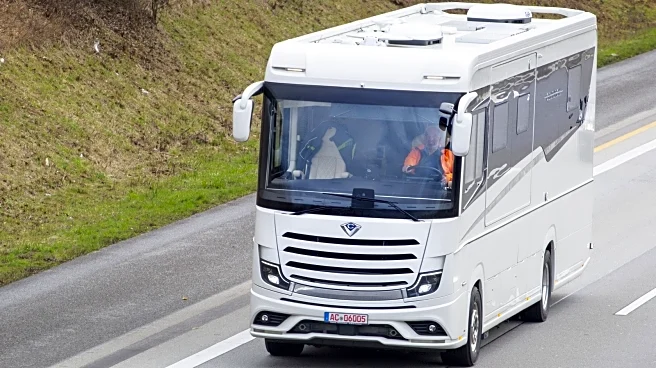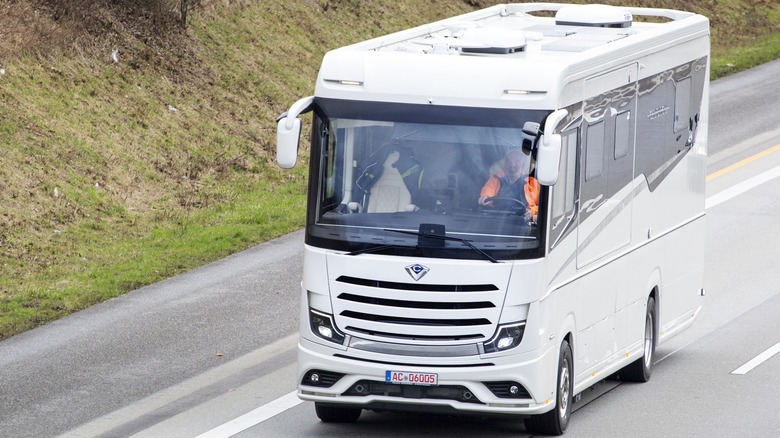
If you're like a lot of folks, you may have been pretty surprised at the final tally the first time you filled up your Class A RV. Some of those monsters have gas tanks with a 150-gallon capacity. If you're driving
a gas-powered RV, you might be wondering if it would be worth it to trade it in for a diesel, since diesel pushers normally get better gas mileage.
It's pretty common to see experienced full-timers "upgrade" from gas to diesel, especially as they move into bigger rigs. Reasons for this can vary, but those bigger Class A rigs are where you more commonly find diesel engines. After an RVer has spent years on the road, they may find they could do with a few more comforts, more room to move around in, or they've just accumulated more stuff. A bigger RV just better suits their needs. Then there's the difference in performance. Diesel engines typically last longer and are more powerful. They also have greater towing capacity and better performance going up and down mountain roads. As an RVer's setup expands to include a towed car or boat, it makes sense to look at diesel RVs.
First-time RV buyers, on the other hand, are often drawn to gas RVs by the initial sticker price. Diesel RVs are more expensive than gas-driven RVs in the same class, sometimes a lot more expensive, as in $100,000 or more. When you factor in how much more expensive the average diesel repair is compared to those done on an ICE RV, the gas-driven option can be especially appealing to the budget-conscious. And that's why it's important to sit down and figure out your RV needs and total budget before choosing between a gas or diesel RV.
Read more: Consumer Reports' 10 Best Used Cars Under $20,000 Are A Great Way To Dodge Republican Tariffs
Gas RVs Vs Diesel RVs: Which Are More Affordable?
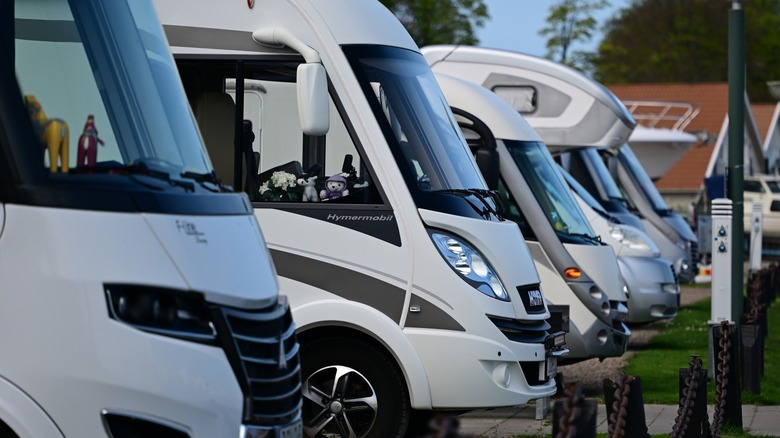
There have probably been several RVers who were excited to find a good diesel rig, only to come away from dealerships a lot less enthusiastic when they saw how much more expensive diesels are. As an example, we checked Class A prices at Winnebago before writing this article and compared gas models to diesel pushers. Their least expensive Class A models, Sunstar and Vista, both have an MSRP of approximately $208,000. The least expensive diesel model, Forza, was at $361,000. The same is true for their most expensive models. The gas-driven Adventurer's MSRP comes in around $252,800, while the diesel Journey starts at around $480,000.
The reason for this difference, in part, has to do with the greater complexity of a diesel engine. Diesel engines have more sophisticated emissions control systems to meet regulations and require special fuel system components. Diesel engines also require heavier-duty chassis due to the engine's weight.
With the staggering difference in sticker prices, the choice between gas and diesel may seem like a no-brainer, especially to those on a budget. But cost and affordability aren't just about the up-front price. The resale value of the average diesel RV is higher than its gas-driven counterparts, partly because diesel engines last much longer than gas engines. Since diesel RVs depreciate at a slower pace than gas motorhomes, you can expect a better deal when it's time to trade in your diesel pusher.
Gas RVs Vs Diesel RVs: Which Get Better Gas Mileage?
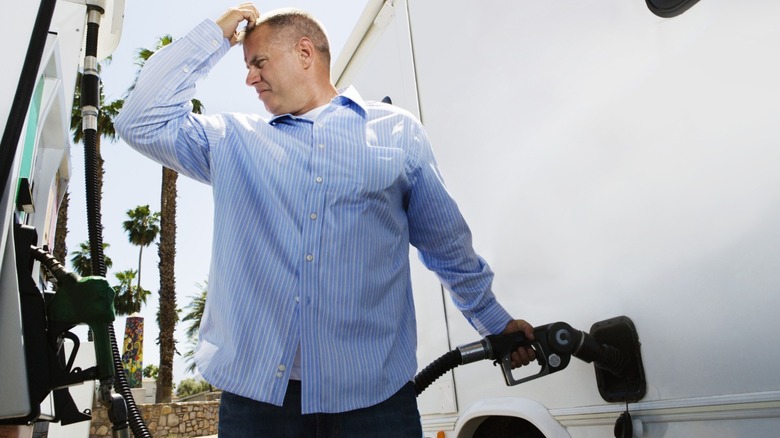
You probably already know that diesel vehicles get better gas mileage than vehicles with internal combustion engines. But the difference isn't that drastic when it comes to RVs. Average gas mileage for a gas-driven RV is six to 10 mpg That goes up just slightly to seven to 12 mpg for a diesel RV. That's approximately an 18% difference between the most efficient gas and diesel RVs. Of course, when you're driving hundreds of miles at a pop and filling a tank that has a capacity of 100 gallons or sometimes more, that 18% can seem like a significant difference at the gas pump.
Is it really, though? While it's true that gas prices fluctuate wildly, diesel fuel is consistently more expensive. At the time of this writing, gasoline cost on average $3.13 in the U.S., according to the U.S. Energy Information Administration. Diesel, on the other hand, cost $3.71 on average in the U.S. That is a difference of around 17%, which is pretty close to the difference in gas mileage between gas and diesel RVs.
And in addition to the higher per gallon fuel prices, is the cost of DEF, or Diesel Exhaust Fluid. This is a fuel additive that is required for RVs with newer diesel engines. The amount of DEF you have to add depends on your vehicle, but it ranges from about 2% to 5% of your total fuel amount. It costs from $3 to $5 per gallon at the pump, and $5 to $8 per gallon when you buy it in a container. So, when you factor in everything, we consider the gas versus diesel RV contest a wash when it comes to gas mileage.
Gas RVs Vs Diesel RVs: Which Performs Better?
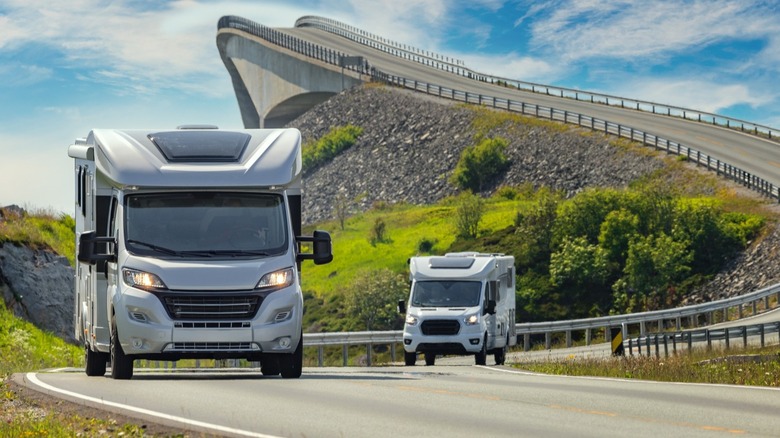
You're going to get better overall performance out of a diesel RV than a gas RV. The more powerful diesel engine will perform better climbing steep hills, as well as decelerating more smoothly on the way down. Diesel engines produce more torque, meaning they can better maintain consistent speeds, even when loaded down with a lot of weight. Diesel RVs are also typically equipped with air brakes, while gas RVs use disc brakes. Air brakes are considered more reliable at quickly stopping a heavy vehicle, like an RV. This can be especially important when driving down mountain roads.
Towing is an important consideration for a lot of RVers. Diesel engines in general are known to be better at towing, because they are more powerful and produce more torque. The average towing capacity of a gas-driven RV is 5,000 pounds compared to 10,000-15,000 pounds for a diesel. The difference in GVWR (Gross Vehicle Weight Rating) is just as drastic: 25,000-40,000 pounds for Class A diesels, compared to just 16,000-22,000 pounds for gas-powered RVs.
Diesel engines often last a lot longer than gas engines, as well. The average diesel engine can go for around 400,000 miles or more. A gas engine, on the other hand, will typically go from 150,000 miles to 200,000 miles. This, of course, affects resale value. It is true that gas RVs generally have more horsepower. This also means that they can accelerate faster, which gives them a slight advantage when merging. But how fast your Class A can go from zero-to-60 mph on a straightaway is probably not that big of a priority for you. It's not as if you'll be trying to drag race it (please don't).
Gas RVs Vs Diesel RVs: Which Are Easier To Maintain?

On the con side for diesel and pro side for gas, diesel repairs and maintenance tasks are more expensive than for gas. Take oil changes, for example. Camping World charges $329 for oil changes on diesel RVs with up to 20 quarts of oil, but just $169 for an oil change with up to 8 quarts of oil on a gas RV. As you can see, oil changes are more expensive for diesel engines, partly because they require so much more oil. But most other repairs on diesel engines are significantly more expensive, as well. Parts for diesel engines cost more, and repairs require the services of a mechanic who specializes in diesel.
What about doing your own maintenance on a diesel engine? Going back to oil changes, the oil by itself is going to set you back a pretty penny. For example, the Cummins ISL diesel engine requires 29 quarts of oil. Buying 29 quarts of the cheap 15w40 oil (recommended viscosity) from AutoZone will set you back over $120. For that plus the cost of an oil filter, you could have paid for an oil change in a gas RV.
And that's assuming you have the skills to work on a diesel. Just accessing the oil cap and filter can be an ordeal. Most diesel pushers have a hatch for this in the interior, like under the bed or in a closet or bathroom. On the flip side, diesel engines require less maintenance and fewer repairs. Most RV gas engines require oil changes every 3,000 to 5,000 miles, while diesel RVs only need them every 7,500 to 15,000 miles. That means you're paying for 2-3 times as many oil changes in a gas RV than a diesel.
Gas RVs Vs Diesel RVs: Other Factors
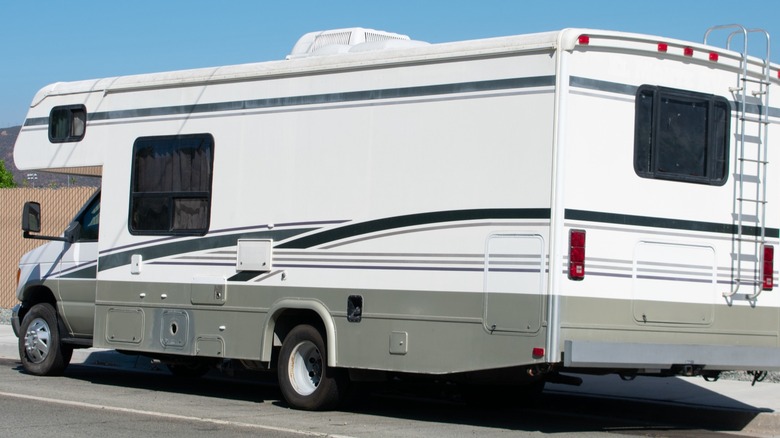
There are plenty of other factors you should take into consideration in your internal gas versus diesel RV debate. For instance, diesel pushers provide a quieter ride than gas RVs. That's because the engines in diesel pushers are in the rear, taking the noise away from the front of the cabin. Do you live or camp where it gets below freezing in the winter? You might be surprised to learn that diesel fuel can gel up in below-freezing temperatures, clogging your fuel filter and the fuel line. There are additives made for diesel fuel that can keep this from happening. But you won't have to worry about that with a gas engine, since gasoline doesn't freeze above -100 degrees.
Diesel pushers are usually equipped with air suspension. This type of suspension is adjustable, meaning that you can increase your ground clearance when going off-road. You can also lower your rig slightly to increase your clearance above the RV, which can be useful when going under overpasses and low-hanging limbs, as well as fitting under some garage doors. Air suspension also does a better job of dampening road vibration, which helps to preserve other parts of the vehicle.
So, should you make a gas or diesel motorhome your next RV? Consider your needs. If you want to move into an RV with a ton of room and intend to put a lot of miles on it, a diesel Class A is probably the better way to go. The same is true if you need to tow a car or boat. If you're on a tighter budget, only camp occasionally, and don't need a lot of room, you'll probably want to opt for a Class B or C gas-driven RV.
Want more like this? Join the Jalopnik newsletter to get the latest auto news sent straight to your inbox...
Read the original article on Jalopnik.
